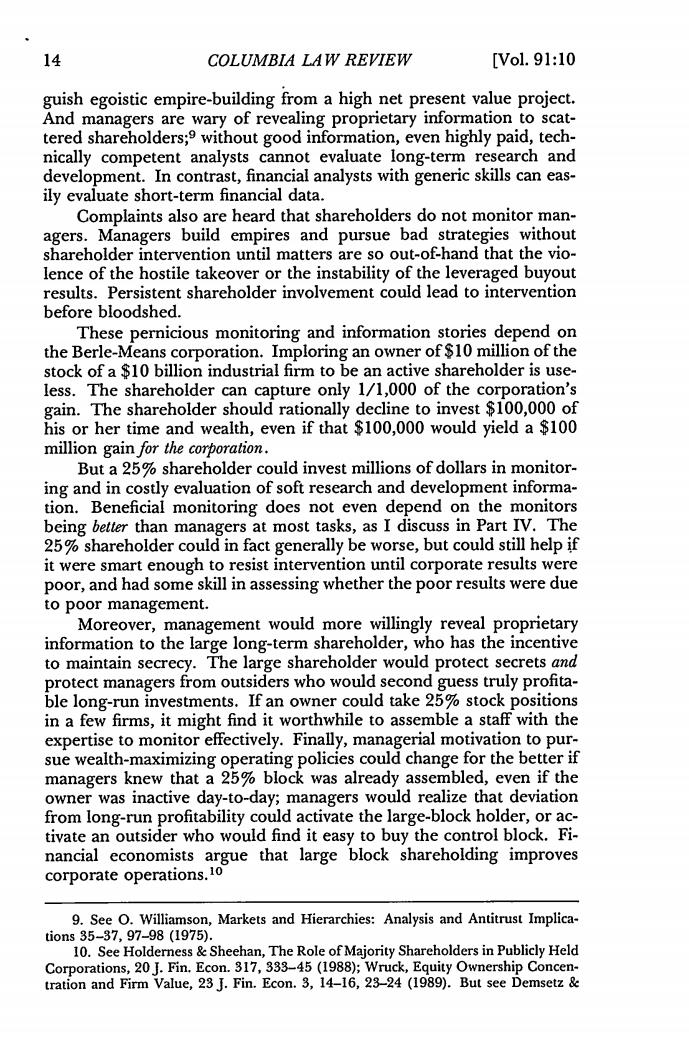正在加载图片...

14 COLUMBIA LAW REVIEW [Vol.91:10 guish egoistic empire-building from a high net present value project. And managers are wary of revealing proprietary information to scat- tered shareholders:9 without good information,even highly paid,tech- nically com petent analysts c nnot evaluate long-term research and opment In contra cial analysts with gene ric skills can eas ily evaluate short-term financial data. Complaints also are heard that shareholders do not monitor man- agers.Managers build empires and pursue bad strategies without reholder in lenc e of theh tervention until matters are so out-of-hand that the vio- or the of the leve raged buyout results.Persistent shareholder involvement could lead to intervention before bloodshed. the Bne perniclous monitoring and intormnation stores depend on oration.Imploring an owner of $10 million of the stock。 a $10 billi be sha reholder is us less. The sharehol lder can capture only 1/1,000 of the corporat ' gain.The shareholder should rationally decline to invest $100,000 of his or her time and wealth,even if that $100,000 would yield a $100 million gain for the corporation But a 25%shareholder could invest millic ons of dollars in monitor ing and in costly evaluation of soft research and development informa- tion.Beneficial monitoring does not even depend on the monitors being better than managers at most tasks,as I discuss in Part IV.The 25%shareholder could in fact generally be worse,but could still help if it were art en ough to resist tion until corporate results w poor,and had some skill in assessing wheth the poor re were due to poor management. Moreover.management would more willingly reveal proprietary information to the large long-term shareholder,who has the incentive to maintain secrecy. The large sha reholder would protect secrets and protect managers from outsi ders who would guess truly pro fita ble long-run investments.If an owner could take 25%stock positions in a few firms,it might find it worthwhile to assemble a staff with the expertise to monitor effectively.Finally,managerial motivation to pur- wealth maxim managers knew tha change 95 was already if the owner was inactive day-to-day;managers would realize tha deviation from long-run profitability could activate the large-block holder,or ac tivate an outsider who would find it easy to buy the control block.Fi- aeconomcague that large block sharcholding improves corporate operai Markets and Hierarchies:Analysis and Antitrust Implica 10.See Holderness &Sheehan,The Role of Majority Shareholders in Publicly Held 24(1989).But see I emsetzCOLUMBIA LAW REVIEW guish egoistic empire-building from a high net present value project. And managers are wary of revealing proprietary information to scattered shareholders; 9 without good information, even highly paid, technically competent analysts cannot evaluate long-term research and development. In contrast, financial analysts with generic skills can easily evaluate short-term financial data. Complaints also are heard that shareholders do not monitor managers. Managers build empires and pursue bad strategies without shareholder intervention until matters are so out-of-hand that the violence of the hostile takeover or the instability of the leveraged buyout results. Persistent shareholder involvement could lead to intervention before bloodshed. These pernicious monitoring and information stories depend on the Berle-Means corporation. Imploring an owner of $10 million of the stock of a $10 billion industrial firm to be an active shareholder is useless. The shareholder can capture only 1/1,000 of the corporation's gain. The shareholder should rationally decline to invest $100,000 of his or her time and wealth, even if that $100,000 would yield a $100 million gainfor the corporation. But a 25% shareholder could invest millions of dollars in monitoring and in costly evaluation of soft research and development information. Beneficial monitoring does not even depend on the monitors being better than managers at most tasks, as I discuss in Part IV. The 25% shareholder could in fact generally be worse, but could still help if it were smart enough to resist intervention until corporate results were poor, and had some skill in assessing whether the poor results were due to poor management. Moreover, management would more willingly reveal proprietary information to the large long-term shareholder, who has the incentive to maintain secrecy. The large shareholder would protect secrets and protect managers from outsiders who would second guess truly profitable long-run investments. If an owner could take 25% stock positions in a few firms, it might find it worthwhile to assemble a staff with the expertise to monitor effectively. Finally, managerial motivation to pursue wealth-maximizing operating policies could change for the better if managers knew that a 25% block was already assembled, even if the owner was inactive day-to-day; managers would realize that deviation from long-run profitability could activate the large-block holder, or activate an outsider who would find it easy to buy the control block. Financial economists argue that large block shareholding improves corporate operations. 10 9. See 0. Williamson, Markets and Hierarchies: Analysis and Antitrust Implications 35-37, 97-98 (1975). 10. See Holderess & Sheehan, The Role of Majority Shareholders in Publicly Held Corporations, 20J. Fin. Econ. 317, 333-45 (1988); Wruck, Equity Ownership Concentration and Firm Value, 23 J. Fin. Econ. 3, 14-16, 23-24 (1989). But see Demsetz & [Vol. 9 1: 10